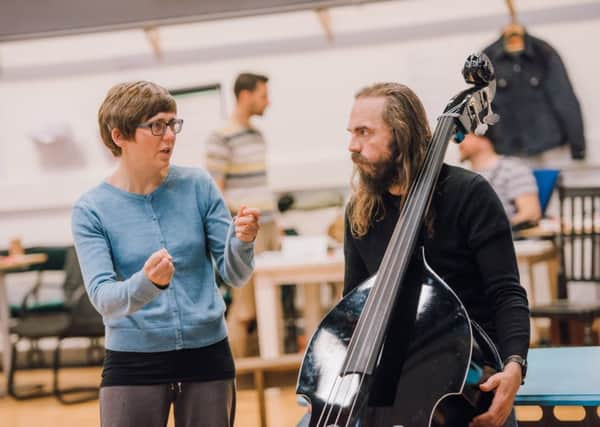Theatre interview: Director Wils Wilson on celebrating the 'roughness' in Twelfth Night at the Royal Lyceum


Despite her unassuming style, in the last dozen years Wilson has become a quiet powerhouse of creativity in Scottish theatre, directing some of the most acclaimed shows staged in that time by the National Theatre of Scotland and the Lyceum. Her first Scottish production, in 2006, was Home Shetland, part of the NTS’s ground-breaking opening production staged at ten sites around the Scotland; those lucky enough to have seen it will never forget her inspired use of space around the great Northlink ferry docked at Lerwick, including its vast car-deck.
For the NTS, she also co-created a memorable cafe-style children’s show called Gobbo, working for the first time with David Greig; and then in 2011, she directed Greig’s 21st century Borders ballad The Strange Undoing Of Prudencia Hart, in a pub-style production so irresistible that it has remained in the NTS repertoire ever since, touring across the globe. In 2016, Greig invited her to join his Lyceum team; and since then she has directed Karine Polwart’s remarkable solo show Wind Resistance, last autumn’s memorable staging of Bridget Boland’s Cockpit, in which the Lyceum became a post-Second World War refugee transit centre, and – with choreographer Janet Parker – this summer’s astonishing Edinburgh community production of Peter Handke’s The Hour We Knew Nothing Of Each Other.
Advertisement
Hide Ad“I suppose what interests me,” says Wilson, “is theatre that makes an immediate, direct connection with the audience, and completely breaks down the fourth wall. I began making theatre in London in the 1990s, when the whole trend towards site-specific theatre was emerging; and I became absolutely fascinated by that idea of theatre that doesn’t just take the space around it for granted, but is completely responsive to it, and takes the audience into a real journey of exploration.” From 1997 to 2007, Wilson and designer Louise Ann Wilson ran their Yorkshire-based company Wilson & Wilson, creating shows in locations that included a pair of empty terraced houses in Wilson’s home town, Huddersfield; and it was when fellow Huddersfield man John Tiffany, then at the NTS, came south to see a Wilson & Wilson show staged in woodland on the Yorkshire coast, that Wilson won her first Scottish commission to create Home Shetland.
“I asked to be sent as far away from where I was as possible,” Wilson remembers. “And although my son was just a baby, it worked out brilliantly. You could say that I like theatre that’s quite rough,” she adds, “which makes it interesting, at the very least, to be working in a space like the Lyceum.” And she glances round at the red plush of the circle bar, which echoes the gorgeous gilded formality of the theatre’s Victorian auditorium.
In truth, though, the Lyceum is a massively complex and forceful theatre space, one that often responds well to bold treatment. So far, Wilson’s evolving relationship with it has produced some thrilling results; and as she turns her attention to Twelfth Night, she says that she is drawn to Shakespeare precisely because of his “roughness” as a playwright, and the complete absence, in his theatre, of any kind of fourth wall.
“I chose Twelfth Night initially because it has so much music in it,” says Wilson, “and I love the musical aspect of theatre. As I’ve been working on the play, though, I’ve become more and more aware of how practical and workaday Shakespeare is as a writer. He’s interested in the nuts and bolts of theatre, he’s not theoretical. And that goes for the deeper level of his work as well – it’s all about his instinctive understanding of human behaviour, I think, rather than about grand theories or themes. The scale of it can be daunting, though; there’s such richness and range in the text exploring it really could take a lifetime.”
Wilson is working on Twelfth Night with a cast of 12, and she says that her approach is to treat the play as a giant Twelfth Night party, a feast of misrule when people can change costumes, play unfamiliar roles, swap genders and turn the world upside down. As the steward Malvolio, she has cast Christopher Green, better known for his female stand-up characters including Tina C and Ida Barr; her Toby Belch is the brilliant young Scottish actress and singer Dawn Sievewright. Yet at the same time, she is very conscious of the play’s darker undertones; and although audiences are promised a party show with an early-Seventies op-art feel, there’s a sense that this wild party could also be tinged with grief.
“Scotland is a good place to make theatre,” says Wilson, “because you have to think hard about questions like that, about what your shows mean. You can’t just go around being an idiot in some creative way. It’s hard to say why, without ridiculous generalisations; but I think it’s something to do with being a smaller country with its own strong national life. You feel more connected to all aspects of life here – and that makes you more accountable, more involved, more engaged. And that’s why I’ve chosen to be here,” she adds, as she heads back into rehearsal. “Because for me, that’s how it should be, and how I want to work.” - JOYCE MCMILLAN
Twelfth Night, Royal Lyceum, Edinburgh, until 6 October